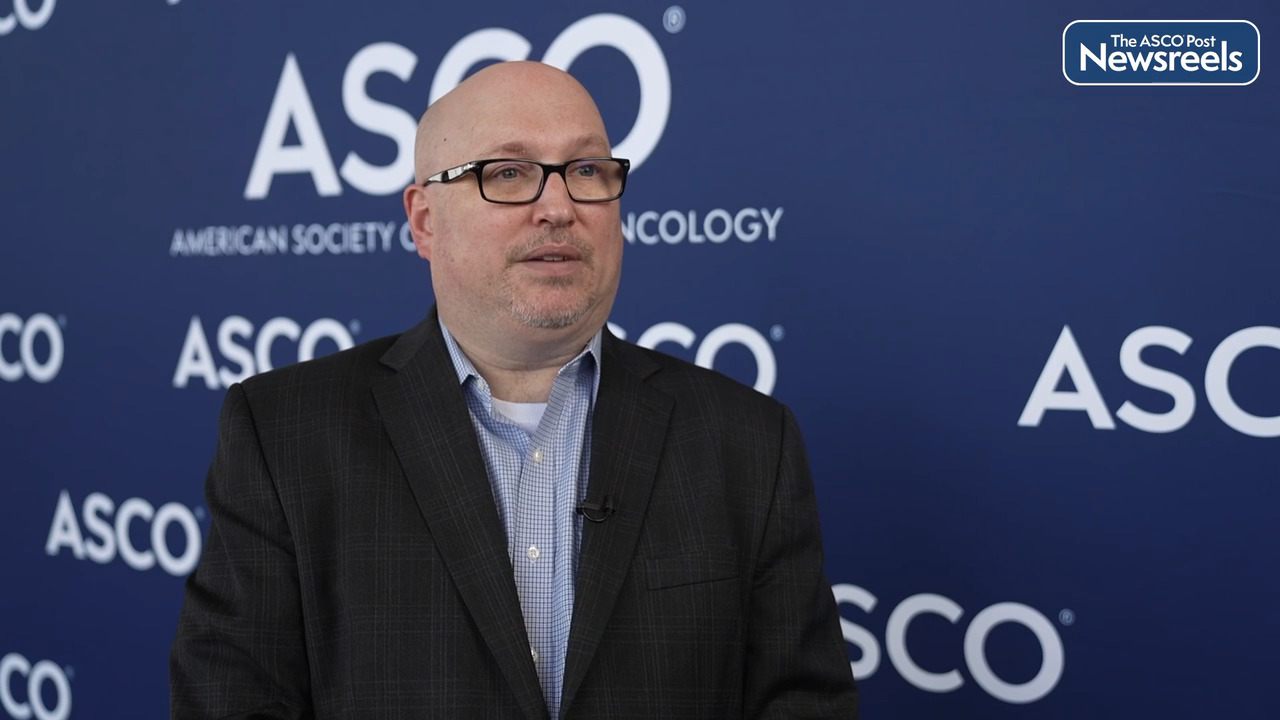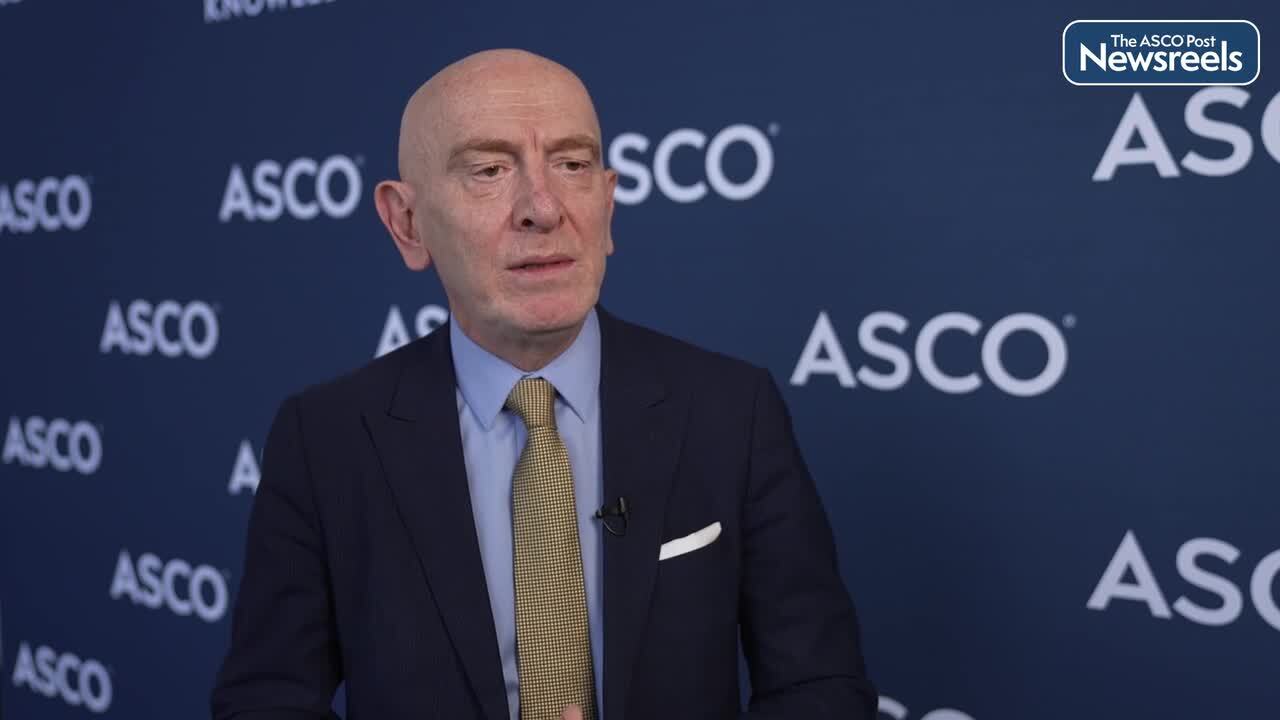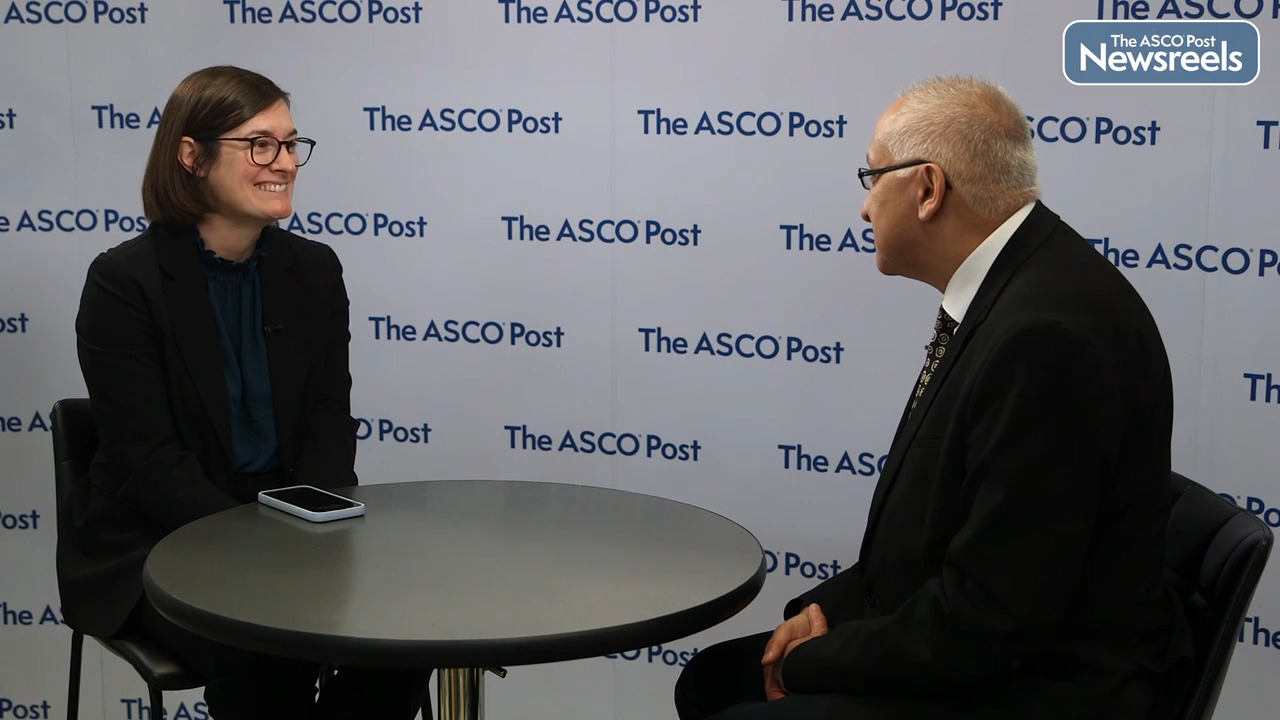Nirav N. Shah, MD, on Mantle Cell Lymphoma: Follow-up Data on Pirtobrutinib in Pretreated Disease
2023 ASCO Annual Meeting
Nirav N. Shah, MD, of the Medical College of Wisconsin, discusses the efficacy and safety of pirtobrutinib, a highly selective, noncovalent BTK inhibitor, studied for more than 3 years in the BRUIN trial. The results showed that the use of pirtobrutinib continues to have durable efficacy and a favorable safety profile in heavily pretreated patients with relapsed or refractory mantle cell lymphoma and prior BTK inhibitor therapy. Responses were observed in patients with high-risk disease features, including blastoid/pleomorphic variants, elevated Ki67 index, and TP53 mutations (Abstract 7514).
Transcript
Disclaimer: This video transcript has not been proofread or edited and may contain errors.
Nirav N. Shah:
So mantle cell lymphoma is a disease that sort of is felt to be a relapsing remitting disease, which means that most patients are going to relapse in their lifetime. Now, while we have very, very good therapies for relapse mantle cell, which generally include covalent BTK inhibitors. For those patients who progress after covalent BTK inhibitors, options are limited. We have treatments like CAR T-cell therapy, but not all patients are healthy enough, fit enough, or are in an area where CAR T-cell therapy is accessible. So pirtobrutinib was studied as part of the BRUIN trial to look specifically at patients with B-cell malignancies. And the data being reported is looking at the cohort of patients with mantle cell lymphoma who received this drug in a relapsed refractory setting. Unlike other BTK inhibitors pirtobrutinib is a non-covalent reversible inhibitor showing that it has a different mechanism of action than the BTK inhibitors that are currently being used in the second line setting.
As part of the BRUIN study, whether or not you had prior BTK exposure was not an exclusion, and so actually the majority of patients who received pirtobrutinib, 90 of them, actually had prior BTK exposure, which is an unmet need in mantle cell lymphoma. Despite seeing a different BTK inhibitor, first, the overall response rate with pirtobrutinib was 58% in this heavily pretreated group, which is really just exciting to have another oral agent be effective in that patient population. Not only was it effective, but there were also durable responses. And so now in this sort of two year long term follow-up, we know that the median duration of response for those patients who were responding to therapy was 18 months, and the median overall survival was nearly 2 years.
This data actually led to this drug now being FDA approved and in this clinical setting and available, and part of that is because the safety profile that's demonstrated in the BRUIN study in this patient population was actually quite favorable. The toxicities were low and the traditional BTK toxicities, things like atrial fibrillation, hypertension, and bleeding were actually seen at very low rates, such that may occur actually in a general patient population.
In conclusion, I think that pirtobrutinib represents a novel mechanism of action in inhibiting the BTK pathway and allowing patients that have failed other covalent BTK inhibitors to continue receiving an oral medication that has now shown incredible efficacy, safety, and durability.
Related Videos
The ASCO Post Staff
Catherine C. Coombs, MD, of the University of California, Irvine, discusses prolonged pirtobrutinib therapy, which continues to demonstrate a safety profile amenable to long-term administration at the recommended dose without evidence of new or worsening toxicity signals. The safety and tolerability observed in patients on therapy for 12 months or more were similar to previously published safety analyses of all patients enrolled, regardless of follow-up (Abstract 7513).
The ASCO Post Staff
Thomas E. Hutson, DO, PharmD, of Texas Oncology, discusses the 4-year follow-up results from the CLEAR study for patients with advanced renal cell carcinoma (RCC). The data showed that lenvatinib plus pembrolizumab continues to demonstrate clinically meaningful benefit vs sunitinib in overall and progression-free survival, as well as in overall and complete response rates, in first-line treatment (Abstract 4502).
The ASCO Post Staff
Muhit Özcan, MD, of Turkey’s Ankara University School of Medicine, discusses waveLINE-007, a two-part study now recruiting in more than 20 locations, to determine the safety and recommended phase II dose of the antibody-drug conjugate zilovertamab vedotin in combination with R-CHP (rituximab, cyclophosphamide, doxorubicin, prednisone) in previously untreated patients with diffuse large B-cell lymphoma (DLBCL). Efficacy of this regimen will be investigated in the second half of the study (Abstract TPS7589).
The ASCO Post Staff
Bobbie J. Rimel, MD, of Cedars-Sinai Medical Center, and Mansoor R. Mirza, MD, of Denmark’s Rigshospitalet and Copenhagen University Hospital, discuss new findings on dostarlimab-gxly plus carboplatin/paclitaxel, which improved progression-free survival while maintaining health-related quality of life, further supporting its use as a standard of care in primary advanced or recurrent endometrial cancer (Abstract 5504).
The ASCO Post Staff
Rana R. McKay, MD, of the University of California, San Diego, and Toni K. Choueiri, MD, of Dana-Farber Cancer Institute and Harvard Medical School, discuss results from the phase III CONTACT-03 study, showing that, for patients with metastatic renal cell carcinoma (RCC), adding the PD-L1 inhibitor atezolizumab to cabozantinib did not improve clinical outcomes compared with treatment with cabozantinib alone. In addition, higher toxicities were observed in the combination arm (Abstract LBA4500).





